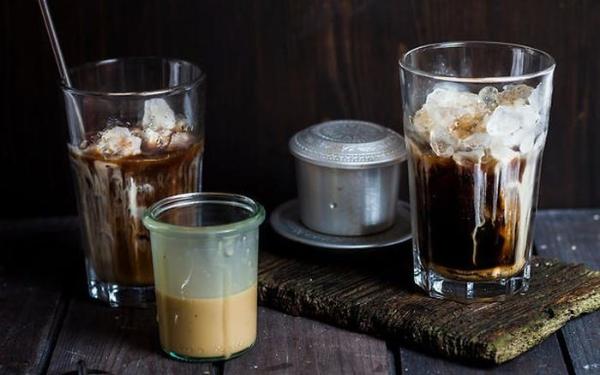Famous for its rich, unique coffee flavor and characteristic bitter taste. Therefore, Vietnamese coffee is increasingly gaining popularity worldwide, sparking curiosity about its unique flavor.
In this journey, we delve into the robust narrative of Vietnamese coffee, uncovering the question “Is Vietnamese coffee strong?” as well as the cultural significance that makes it a standout in the global coffee scene.
What is Vietnamese coffee?
Vietnam’s coffee history dates back to the 19th century, when coffee plants were brought over during the French colonial era. They brought Arabica and Robusta to Vietnam; however, for Arabica, it was unable to adjust to the hot and muggy weather in Vietnam.
On the contrary, Robusta was thriving. Therefore, when the French started investing in the construction of coffee estates in the Central and Central Highlands, Vietnam’s coffee industry began to grow rapidly.

The main source of Vietnamese coffee is Robusta beans
Vietnam is currently experiencing explosive development in its coffee sector, encompassing a wide range of commercial ventures from coffee plantations to coffee shops and facilities that process coffee.
Furthermore, coffee-related goods, including coffee powder, instant coffee, coffee creamer, and coffee chocolate, are also produced and sold to other countries in addition to coffee itself.
How strong is Vietnamese coffee?
As mentioned, the majority of coffee produced and grown in Vietnam is the Robusta kind and its caffeine content is twice the amount of Arabica, about 2.5 to 3%. This plays a role in giving the individual who drinks a powerful, rich cup of coffee.

One of the reasons Vietnamese coffee is so strong
On average, a cup of Vietnamese coffee (around 250ml) made from Robusta beans can contain anywhere from 265 milligrams of caffeine, but these values are approximate and can fluctuate based on specific brewing techniques and individual preferences. Arabica, meanwhile, has about 120 -140 mg.
It’s worth noting that the use of condensed milk or other additives in Vietnamese coffee can also influence the overall caffeine concentration in the final beverage.
Why is Vietnamese coffee strong?
The strength of Vietnamese coffee can be attributed to a combination of three key factors.
Coffee bean types
The first essential aspect that builds Vietnamese coffee's intensity is because of Robusta beans. Robusta beans, a variety known for its robust and hardy nature, contain higher levels of caffeine compared to the commonly used Arabica beans.
Robusta beans are inherently more bitter and have a stronger taste, providing a distinct character to the brewed coffee. This choice of bean not only enhances the caffeine concentration but also adds a robust and earthy undertone to the overall flavor, making Vietnamese coffee a unique and powerful experience.
The intentional selection of Robusta coffee beans underscores the cultural and historical preferences that have shaped Vietnam’s coffee, setting it apart as a strong and distinctive brew in the global coffee landscape.
Roasting process
The other factor that can help you figure out “is Vietnamese coffee strong?” - Vietnamese coffee’s potency is mostly determined by the particular roasting method used, rather than just the Robusta beans that are used. The beans are roasted using a technique known for its intensity and black color.
Enhancing the solid and bold characteristics of the finished brew requires roasting the beans to a deep, dark roast. The Robusta beans’ natural qualities are enhanced by this careful roasting method, which also helps to generate profound, robust flavors.

The roasting process helps the coffee taste more intense
View more: Enjoy a perfect cup of coffee with condensed milk with easy recipes
The coffee gains an earthy and distinct flavor character from the dark roast, which also gives it a smokey flavor. Furthermore, roasting intensifies the overall strength of Vietnamese coffee by caramelizing the sugars in the beans, which add richness and depth to the taste.
Brewing methods
One of the most traditional and widely recognized methods is the use of a “phin” filter, a small metal drip filter that allows hot water to slowly pass through the coffee grounds. This method creates a strong and concentrated brew, and it is a popular choice for locals and visitors alike.

Complete the taste with the phin filter method
Brewing Vietnamese coffee with a French press offers a delightful departure from the traditional “phin” method, introducing a unique twist to the rich coffee culture of Vietnam.
This method allows for experimentation with the coffee-to-water ratio, providing coffee with a bold flavor; nevertheless, it might not give the same precise undertones as coffee prepared using the traditional Vietnamese “phin filter” technique.
Another way to brew Vietnamese coffee is using an aeropress, though it’s not really common in Vietnam. This method also yields a strong and concentrated coffee with a distinct flavor profile.
88 Coffee is a top-rated destination for the strongest Vietnamese coffee
With an unwavering commitment to quality and tradition, 88 Coffee brings the most authentic Vietnamese coffee culture with rich and intense flavors. By carefully selecting Robusta beans and going through a traditional butter roast, we offer the perfect cup of coffee for you.

88 Coffee - Giving you the genuine quality of coffee from Vietnam
Shop our product, 88 Coffee Company Butter Roast Vietnamese Coffee, and combine it with a gold-plated Vietnamese Phin Coffee Filter to complete your drink.
In conclusion, “Is Vietnamese coffee strong?”. Well, definitely! Fueled by the Robusta beans’ higher caffeine content, the strong character of Vietnamese coffee is further emphasized through the meticulous roasting process and traditional brewing methods like the phin filter.
Coffee lovers all throughout the world have been enthralled by this combination since it produces a strong and bold coffee experience. Vietnamese coffee is distinguished by its intensity, richness, and cultural relevance, regardless of whether it is consumed in its traditional forms or in creative adaptations.

